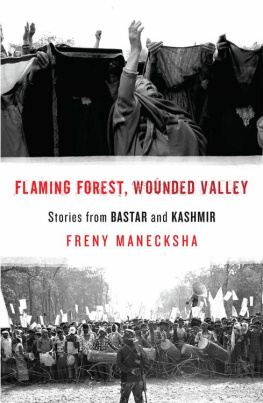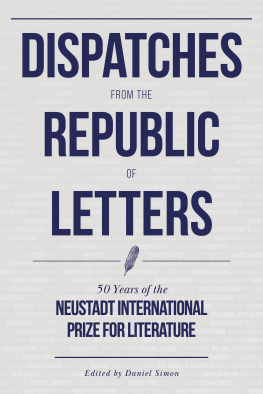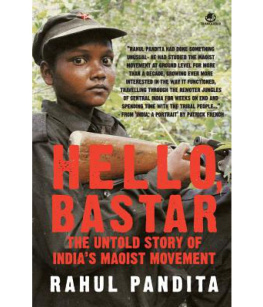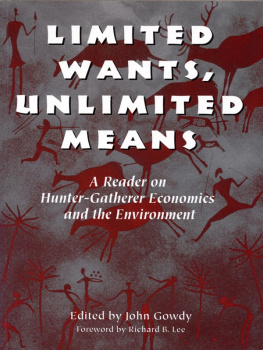Table of Contents
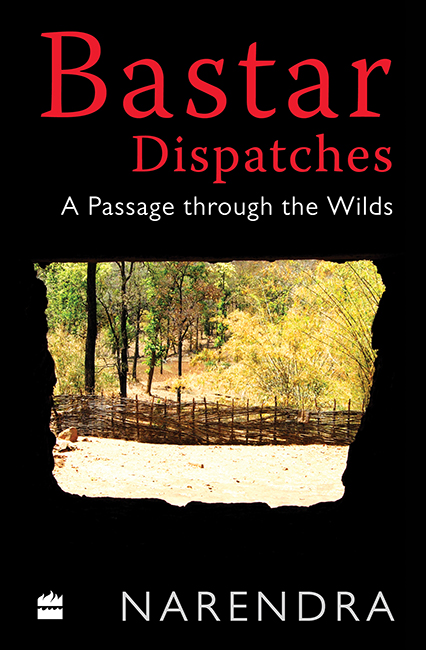
Bastar Dispatches
A PASSAGE THROUGH THE WILDS
NARENDRA

To the Adivasis of Abujhmad
CONTENTS
IN 1975, I WENT to Puducherry from Delhi. In the 1970s many of us did not know what to do with life. I stayed in Puducherry for a little short of a year. Soon enough, there came a feeling of disappointment and heaviness one that had made me leave Delhi, college, home and hearth. There was no money either. Aurobindo Ashram was letting me stay out of generosity. One evening I left Puducherry forever, to walk along the sea and reach Kanyakumari, the southern tip of India, hopefully after a month. It was to be a pilgrimage in atonement of sins that I did not know about. The pilgrimage was abandoned after a nights walk. Stormy winds were blowing in from the sea. Darkness and the roar of the raging water with not a soul in sight were unexpectedly bizarre and scary. I did not have the wherewithal to continue with the pilgrimage. After a night halt in a village, I reached Cuddalore next morning and by evening was back in Puducherry.
Having lived and wandered there for some more time, I reached Paunar in the hope of meeting Vinoba Bhave. Gandhiji has deeply interested me since childhood, and there was a compelling wish to meet someone who had been close to him. My only knowledge of Vinoba was a chapter on him when I was in Standard IV or V. I was fortunate that though Paunar Ashram was meant for women ascetics only, I could stay there for about a year. One of the most striking memories of Paunar is Vinoba emphasizing the need to cultivate patience and perseverance lest one fall spiritually sick. My next stay was at Sevagram Ashram Gandhijis very own. After a year there, I reached Joura (district Morena, Madhya Pradesh) and got involved with the Gandhian experiment in the surrender of dacoits . Without my being aware of it, a lifelong association with Gandhism was building slowly.
During such wanderings, I reached, somewhat serendipitously, Chhattisgarh sometime in 1979. It was then that I went to Bastar for the first time. If memory serves me well, I had not heard of Bastar prior to that. It was also then that I heard of Abujhmad for the first time. Curiosity led me to skirt around its eastern periphery on a borrowed motorcycle. Thus began an inadvertent, lifelong romance with the region. I had practically little or no knowledge of Adivasis till then. But since childhood, I had experienced a strange, unknown and irrepressible longing to be somewhere. The longing found refuge in Bastar. It was like a homecoming.
Almost an entirely Adivasi region, Bastar was a single district till 2000. It lay to the south-east in the then state of Madhya Pradesh. In 2000, Chhattisgarh was carved out of Madhya Pradesh as a separate state. As a single district, Bastar was larger than Belgium and the Indian state of Kerala. Bastar was divided into five smaller districts between 2000 and 2005. The writings that follow come from my engagement with the somewhat back-of-beyond Abujhmad in Bastar. I left Abujhmad in 1985 but to this day it continues to churn within me. There remains a deep self-doubt about articulating the spirit that is Abujhmad.
I went to Abujhmad in 1980 on a field study project of the Centre for the Study of Developing Societies (CSDS), Tribal Perceptions and the Modern World. My stay there continued for the next five years. With an estimated population of about 13,000 and spread over 4,000 sq. km (the core area being about 1,500 sq. km) of, at places, impenetrable vegetation, Abujhmad lies in the deep interiors of Bastar. It has not been surveyed by a government agency nor is there a noticeable government or other presence save in the form of a rusted and rare handpump or a dysfunctional school in an outlying village or two. Till the coming of Maoists in the late 1980s, it has had little or no contact with the outside world. The more interior villages like Ehnar and Nelnar had not known the impact of the wheel.
The small Abujhmadia community lived on food gathering and hunting, with shifting cultivation as a supplement. Shifting cultivation was not practised every year or by each family. Still in a somewhat primeval stage, the region had neither trade, nor industry, commerce, occupation or other modern apparatus. But neither was there hunger, starvation, beggary or lingering disease. Whereas an average village consisted of 34 scattered huts, an average family had 45 members. Amidst the primeval silence of dense wilds, the Abujhmadias continued to live in their tiny bamboo-and-thatch huts.
Within a few months of reaching Abujhmad, it was evident that the area and its people call for a different sensibility. Their dialect had no more than 300 to 500 words and they counted only up to five. We do not need more than that. Night and its dark universe were a phenomenon I had not experienced or imagined earlier. Much of Abujhmad was confounding and bewildering. After the first 56 months, my involvement with the project rapidly decreased.
After leaving Abujhmad, I retired to the contiguous areas. My interest in and study of the Adivasi thematics continued informally till 2013. The thematics of Abujhmad and Bastar had, in a manner of speaking, become intimate for me. Places beckon one to be with them; just as on the day when the time is over they bid goodbye with neither regret, nor lamentations or sadness on either side.
In course of my association there, I found striking echoes of both Gandhi and Vinoba; this was particularly true in Abujhmad. Gandhijis Hind Swaraj and Vinobas asceticism echoed with a striking regularity.
ABUJHMAD IS NOT A mythical construct. Large parts of contemporary Bastar were much the same till maybe a century ago. There are strong echoes as such in two classical works of the 1930s and 40s on the rest of Bastar. Barring these two authors, probably no one else has tried to study Bastar as intimately and tenderly.
Ethnicity has acquired somewhat of a normative significance in contemporary understandings: someone who is ethnically an Adivasi is called Adivasi. Modern polity gives centrality to ethnicity in its arrangement of things. Ethnicity has its functions but is far too insular and divisive. Living amidst the wilds and distanced from the world outside, the Abujhmadia has thrived in historic isolation. Such isolation has not been in his metaphysics and epistemology. They have joined him in a delicate coherence to the mysterious landscape and its beyonds whereby the significance of being human stands quite changed. He lives well outside the issues and parameters of ethnicity and all that it entails. In the formulation of such metaphysics and epistemology, he has had only a little role, though he is comfortable with it. His wilds crafted his ethos and sensibility. His dialect like all dialects and its mystique too come from there.
There is something uneasy in the definition of an Adivasi the world over. Concerns over Adivasis and forests are in a stalemate. There is a similar stalemate in the outside worlds comprehensions and debates about forests, wilds, land, water, animals, energy, justice, culture, freedom, ecology, spirits and the skies. Such dissonances occur when referents for an ancient community come from modern categories as state, progress, democracy, development, economics, governance, market, equality, ecology and the rest. They have little or no echo in the Adivasis experience or memory.
The Adivasi way of life has been compelled to comply with referents such significations that have damaged the rhythms and flows of his wilds and landscape, social cohesion, self-esteem, modes of governance, non-profit economy, spirits and skies, gods, goddesses and ancestors, gender relations and, eventually, his way of life. Even though Abujhmad remained outside its reach, modernity has marginalized the rest of Bastar by working against its own referents or by taking virtually no notice of them. Bastar now draws its signification and sustenance from the outside world, which reinforce the modern world view in its land. Neither the land, nor self-image nor legitimacy is now its own.




